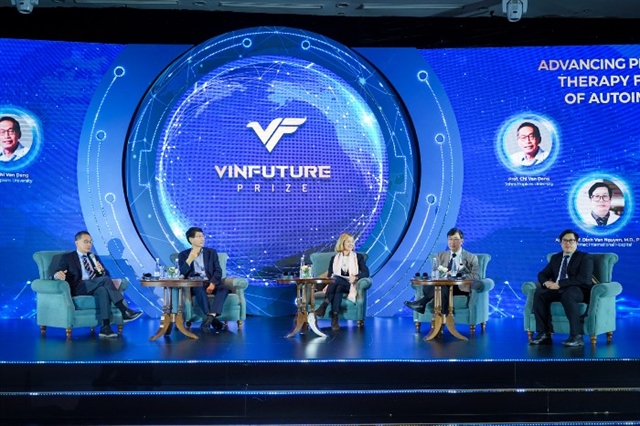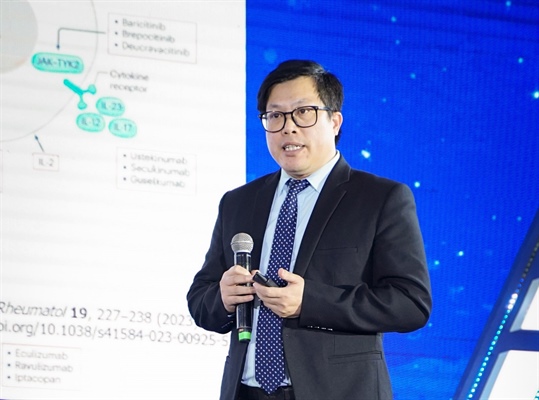 Society
Society

 |
| Panelists at the symposium “Precision immunology therapy for the treatment of autoimmune disorders” on December 18 in Hà Nội. — Photo courtesy of VinFuture organiser |
By Thanh Hải
HÀ NỘI — Promoting precision immunology therapy to treat autoimmune disorders was the main topic of discussion at a symposium in Hà Nội on December 18.
The event, entitled “Precision immunology therapy for the treatment of autoimmune disorders”, is under the framework of VinFuture Science and Technology Week 2023 organised by the VinFuture Foundation.
Speaking at the event, Vice Minister of Health Nguyễn Thị Liên Hương said: "Humans have made significant progress in clarifying the causes of autoimmune disorders, but autoimmune diseases are still a big challenge. There are currently about 100 types of autoimmune diseases among thousands of rare diseases. After the pandemic, we see the risk of autoimmune diseases increase by 20-50 per cent. Việt Nam also recorded a clear increase in the number of people with immune disorders after COVID-19, creating a disease burden for the patients themselves as well as for society.”
"Over the past two seasons, VinFuture Prize has honoured scientists who have contributed to helping solve humanity's challenges. In the context of limited understanding of autoimmune disorders, there are many difficulties in treatment drugs, and this symposium is an opportunity for scientists to collaborate to bring hope to patients," added Vice Minister Hương.
At the event, the world's leading immunologists together with domestic medical experts discussed finding solutions to drive back autoimmune disorders, one of humanity's biggest medical challenges in the post-COVID-19 pandemic period.
Participants heard that autoimmune disease happens when the body's natural defence system can't tell the difference between your own cells and foreign cells, causing the body to mistakenly attack normal cells, such as systemic lupus erythematosus, rheumatoid arthritis or scleroderma.
In the past, autoimmune diseases were considered rare, but they are not rare anymore, and the rate of autoimmune diseases is increasing day by day.
Studies in the United States of America, Germany and England showed that the risk of autoimmune diseases increases by 20-50 per cent after a person is infected with COVID-19 virus. A study from Oxford University (UK) in May 2023 also showed that about 10 per cent of the population suffers from 19 types of autoimmune diseases.
Participants focused discussion on immunological methods and targeted therapy such as T-cell therapy for the treatments for autoimmune diseases. These precision immunology treatments promise to completely cure autoimmune diseases.
 |
| Dr. Nguyễn Văn Đĩnh, Head of the Internal Medicine Department at Vinmec International Hospital, at the National University of Singapore, speaks at the event. — Photo courtesy of VinFuture organiser |
According to Dr. Nguyễn Văn Đĩnh, Head of the Internal Medicine Department at Vinmec International General Hospital, Việt Nam has about 100 million population but the rate of autoimmune diseases is 4 per cent, equivalent to four million people infected with autoimmune diseases.
“However, in Việt Nam as well as many developing countries, the challenge in treating immune disorders today is the gap between patient needs and treatment products. Although there are many drugs, from immunosuppressants to biological treatments (targeted therapy), they only achieve effective symptom reduction and stable disease control, but do not help patients completely recover,” said Dr. Đĩnh.
In addition, according to Dr. Đĩnh, biological drugs or targeted drugs are currently unavailable or too expensive in Việt Nam, making them difficult to access for the majority. Most patients in Việt Nam are using traditional medicines, which cause many side effects such as increased risk of infection and major effects on organ functions such as the liver and kidneys.
Đĩnh added that with experience in developing, researching and applying cell therapy, along with well-trained human resources and a modern equipment system, Vinmec is able and willing to receive technology transfer or conduct research on the application of T-cell therapy in the treatment of autoimmune diseases as well as provide a total solution for diagnosis and analysis of early risk stratification for autoimmune disorders to have appropriately targeted interventions from the beginning.
According to Prof. Pascale Cossart, member of the VinFuture Prize Council, former Head of the Cell Department at the Pasteur Institute, Paris, France, research on immune diseases showed that microorganisms affect treatment therapies, for example cancer. A growing body of evidence suggests that the microbiota impacts immune system response and immunotherapy.
“We must consider antibiotic treatment, prioritise products to boost the immune system or think about solutions of how to replace the intestinal microflora. That is a preventative measure,” said Cossart.
Experts also discussed precision immunotherapies in the treatment of autoimmune disorders, development strategies, potential directions, and barriers that need to be addressed so that patients in developing countries can access treatment for autoimmune disorders.
In the long term, according to experts, it is necessary to promote research on the microbiome and identify beneficial bacteria to effectively improve the immune system to prevent autoimmune diseases. This is a promising direction for mass application.
The event is an opportunity for clinicians and biomedical scientists in Việt Nam to discuss and update their knowledge on immunity from leading experts. — VNS




